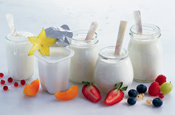
For such a simple food item, yoghurt comes in a surprising number of formats. From plain pots to squeezable, drinkable or mixable products, stores' chiller shelves are packed with innovative variations on the humble diary product.
With its constant flurry of NPD, advertising support from manufacturers and appeal to health-conscious shoppers, yoghurt is well-placed within the food market, and its sales have grown accordingly.
The market for yoghurts, fromage frais and drinking yoghurts grew by 3% to an estimated value of £1.4bn in 2007, according to Mintel. Yoghurt pots and tubes dominated the category, accounting for more than 80% of sales. Natural, Greek and organic lines have performed best, with organic brands such as Yeo Valley and Rachel's Dairy proving popular enough to compete in the mainstream. Both have extended their ranges with products such as tube yoghurts aimed at the children's lunchbox market. Yeo Valley launched it's Yeo's children's' yoghurt tubes last year. It was the first organic producer to do so, and claimed the lowest sugar content of any tube brand.
The increased availability of organic milk has also enabled organic producers to keep their prices competitive, and allowed new brands, such as Stony, to enter the market.
Greek and natural yoghurts have found a market among consumers who wish to avoid artificial ingredients, and research suggests that many are willing to pay more for such products. The Greek brand leader is Total, which offers a 0% fat version and has broadened its appeal by heavily promoting its 2% fat variant.
Low-fat credentials were once a draw for the health-conscious, but consumers' focus has shifted toward functional health products that claim to improve digestion and reduce cholesterol.
The rapid growth of the yoghurt drink segment in the early part of this decade has stalled somewhat, following a decline in value sales between 2006 and 2007, when the market was worth £245m. As only a third of consumers currently buy yoghurt drinks, this remains a large, untapped market for manufacturers, but with 90% of yoghurt drinks positioned as 'active health' products, rival brands' claims are confusing customers. However, Mintel predicts strong growth in the category, with growth in real terms of 103% to reach a value of £500m by 2012, provided that manufacturers create clear and uncomplicated health messages.
Some brands in both the drinking and potted segments are already addressing this issue. Danone's Activia has adopted the strapline 'Beat that bloated feeling', while Müller Vitality has introduced the message '3 in 1 - probiotics, prebiotics and Omega 3'.
Danone's determination to focus on its health brands, Activia (pots) and Actimel (drinking yoghurt), has helped it to grow sales and boost its market share.
It has given heavy advertising support to both products, targeting women under 45, and plans to relaunch its websites as lifestyle portals.
Müller remains the leading brand overall, with a presence in all the major segments. Müller Corner, its top-selling line, and Müllerlight have had to work hard to compete with active health products. The manufacturer has introduced health-oriented extensions such as Corner with Healthy Balance, and placed a focus on natural ingredients.
In 2006, Müller relaunched Müllerlight with probiotic and replaced its Yogz children's brand with Little Stars, a range of yoghurts and fruit jellies made from 100% natural ingredients. The company's latest addition is One A Day yoghurts, which contain a layer of fruit compote that counts toward the 'five-a-day' healthy-eating recommendation for fruit and vegetable consumption.
The biggest consumers of yoghurts are ABC1 women under 45, according to TGI. The market will grow by 45% to reach £2.1bn by 2012, according to Mintel. With food price inflation taken into account, this represents 33% growth.
| ||||||||||||||||||||||||||||||||||||||||||||||||||||||||||||||||||||||||||||||||||||||||||||||||||||||||||||||||||||||||||||||||||||||||||||||||||||||||||||||||||||||||||||||||||||||||||||||||||||||||||||||||||||||||||||||||||||||||||||||||||||||||||||
| ||||||||||||||||||||||||||||||||||||||||||||||||||||||||||||||||||||||

